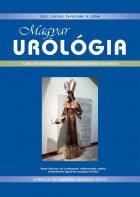Az Országos Onkológiai Intézet Urológiai Daganatsebészeti Központjában végzett első száz robotasszisztált parciális nephrectomia során szerzett tapasztalatok és eredmények, valamint az intracorporalis ultrahang használatának előnyei
ÖSSZEFOGLALÁS
Célkitűzés: Bemutatjuk az intézetben elvégzett első száz robotasszisztált parciális nephrectomia eredményeit, valamint a műtét során az intracorporalis ultrahang használatának előnyeit.
Betegek és módszer: A tanulmányban 2023. február 27. és 2025. február 24. között elvégzett száz robotasszisztált beavatkozás adatait dolgoztuk fel. Vizsgáltuk a kórházi tartózkodás időtartamát, a műtéti időt,...









